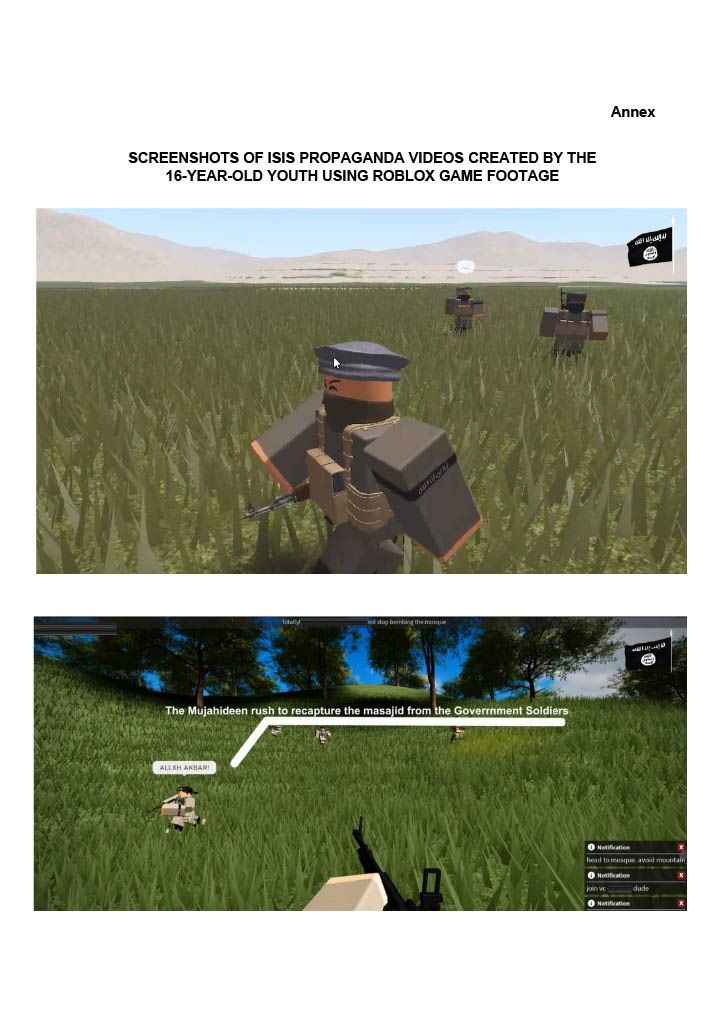Two Singaporean boys handed terrorism-related orders
One is youngest dealt with under Internal Security Act. Other joined ISIS-themed servers on gaming platform Roblox.
SINGAPORE: Two Singaporean teenagers were issued orders under the Internal Security Act (ISA) for terrorism-related activities, with one of them, a 15-year-old boy, being the youngest dealt with under the ISA, the Internal Security Department (ISD) said.
The other Singaporean was issued with a restriction order after he was found to have joined multiple Daesh-themed servers on online gaming platform Roblox, said the ISD in a statement published on the Home Affairs Ministry's website Tuesday.
The 15-year-old boy was a Secondary 3 student at the time of his November-2022 arrest and was issued with a detention order.
Before Tuesday's announcement, a 16-year-old Singaporean boy, who was detained in December 2020 for making plans to attack Muslims at two mosques, was previously the youngest person to be dealt with under the ISA.
“The 15-year-old was self-radicalised by online terrorist propaganda and supportive of Al Qaeda (AQ) and ISIS ,” said the ISD. “He had considered conducting attacks in Singapore and harboured the desire to establish an Islamic caliphate through violent means.
In early 2022, the youth came across podcasts by foreign segregationist preacher, Ismail Menk,2 while searching for religious content online. He avidly consumed these materials, and subsequently went onto other social media platforms in search of more religious knowledge. He was exposed to violent militant content including ISIS propaganda, and engaged in discussions with foreign personas who influenced him with their extremist beliefs.
Menk, according to the ISD, is a Zimbabwean Salafi preacher who has been banned from preaching in Singapore since 2015, because of his segregationist teachings, which promote religious disharmony.
“By mid-2022, he was deeply radicalised, having become convinced that armed violence was permissible against ‘disbelievers’. In his view, ‘disbelievers’ included Shia and Sufi Muslims, and non-Muslims. He also perceived those who ‘oppressed’ Muslims, enforced secular laws or obstructed the establishment of an Islamic caliphate, as ‘disbelievers’ who should be killed.”
The youth expressed support for ISIS, especially its actions in its early stages in 2014, when it was fighting to establish an Islamic caliphate; he also regarded the group’s killing of Shias and Yazidis as being “justified”. He shared pro-ISIS materials on his social media accounts, and tried unsuccessfully to purchase an ISIS flag on e-commerce platforms in the latter half of 2022.
“The youth’s support for AQ stemmed from his idolisation of AQ’s deceased founder Osama bin Laden, whom he viewed as a defender of Islam,” said the ISD. “He believed AQ had defended Muslims from oppression, and regarded the 9/11 attacks as a justified act of retaliation against Americans who had killed ‘innocent Muslims’. He made online postings expressing his support for AQ by justifying the group’s violent actions.”
The second youth first attracted security notice in November 2020 when he was only 14 years old. ISD’s investigations at the time found that he had an interest in far-right extremist content, including those which were anti-Semitic and supportive of neo-Nazi groups whose ideologies promoted a “race war”.
“He was also attracted to Islamic eschatological prophecies of the End-of-Times after watching YouTube videos, and had come across ISIS jihadi nasheeds (songs) from online music streaming platforms,” said the ISD. “The youth was assessed to be vulnerable to radicalisation and was cautioned by ISD to steer clear of extremist content online.
“Despite being warned, the youth continued to imbibe ISIS propaganda and engaged in ISIS-related discussions with other social media users. Over time, he became convinced of ISIS’s legitimacy and supported ISIS’s goal of creating an Islamic caliphate through violence, including through the use of beheadings, shootings, and suicide bombings.”
The youth joined multiple ISIS-themed servers on online gaming platform Roblox, where the virtual game settings replicated physical ISIS conflict zones, such as those in Syria and Marawi city in southern Philippines. The youth regarded himself as an ISIS member in these games, and had taken the bai’ah to an in-game ‘ISIS leader’. The youth was proud of his roles as the “spokesperson” and “chief propagandist” for his in-game ISIS faction. He said his actions in support of ISIS in Roblox, such as shooting and killing ISIS’s “enemies”, were intended to mimic his desire to be an ISIS member in real life.
“The youth propagated his support for ISIS by creating and uploading three ISIS propaganda videos onto social media between late 2021 and early 2022,” said the ISD. “Using his Roblox game footage which showed the virtual ISIS factions conducting attacks, the youth added ISIS nasheeds and superimposed images of an ISIS flag to create the propaganda videos.”
The two youths were online contacts of 18-year-old Singaporean Muhammad Irfan Danyal bin Mohamad Nor, who was detained under the ISA in December 2022. While all three individuals were self-radicalised separately, Irfan and the two youths subsequently became acquainted through the same extremist social media channel. They had not met physically nor discussed plans to travel together.
“In their private conversations online, they shared their radical beliefs and support for terrorist groups. Their family members were not aware of their radical views or support for armed violence,” said the ISD.
“The cases involving Irfan and the two youths demonstrate yet again that extremist ideas continue to find resonance among Singaporeans. Since 2015, ISD has dealt with 11 self-radicalised Singaporean youths aged 20 or below under the ISA. All were radicalised online.”
The ISD said they adopt a comprehensive and holistic approach in the rehabilitation of the detainees and Restriction Order supervisees, comprising religious, psychological and social rehabilitation. The Religious Rehabilitation Group (RRG) and the Inter-Agency Aftercare Group (ACG) are key partners in the rehabilitation programme.




